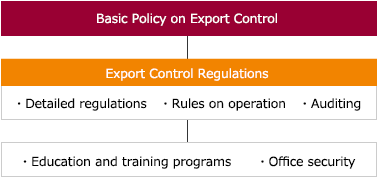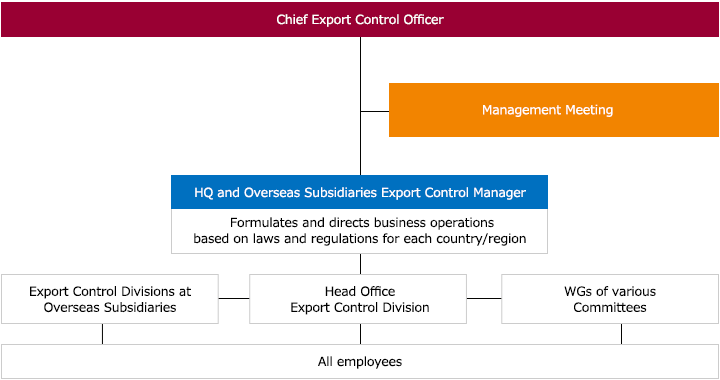In order to keep products and technologies out of the hands of nations and terrorists that threaten the safety of the international community, the Advantest Group pays the utmost caution to laws and regulations regarding security export control, along with self-management. In the unlikely event of an illegal export, legal sanctions such as temporary export bans will be imposed, which will call into question the social responsibility of the company that made the illegal export and lead to severe damage. Advantest has a basic policy of global compliance with laws and regulations, and has established in-house regulations that require export control to be implemented based on each country’s laws and regulations.

In international society, which is changing rapidly, security issues such as terrorist attacks and the development of weapons of mass destruction are becoming more serious by the day. As many Japanese products incorporate advanced technologies, it is necessary to implement measures that prevent leakage to countries and organizations that are subject to international sanctions. The Advantest Group carries out appropriate business practices by having export control officers collect information based on updated laws and orders, etc., based on laws, preventing mishandling by applying them to the entire company system, and incorporating this information into on-site education and training programs.
An export control system in compliance with laws and regulations
At Advantest, the Representative Director, Senior Executive Officer and President serves as the chief executive for export control, who establishes and operates the management system under the leadership of the top management. Meanwhile, to ensure that management decisions are promptly communicated to all employees, the General Manager of Administration (Executive Officer) in Japan, where the company's headquarters are located, and the managers of each overseas subsidiary are responsible for export control respectively, who operate in accordance with the laws and regulations of each country or region and establish an internal system that conforms with our basic export control policy and regulations.

The Export Control Division of the Head Office regularly audits each country whether export procedures are being conducted properly in accordance with the basic policy/rules and regulations on export control, and the results are reported to the Chief Export Control Officer (Group CEO) and the Export Control Manager of each country.
Export control in the case of US-China trade friction
The working group in the figure considers and takes measures against
the trade friction between China and the US. Although this is an issue
in terms of international law, US export control regulations are
applied extraterritorially to Japan. For this reason, working groups with the participation of related domestic and overseas parties have been established to share information at bi-weekly meetings and to ensure that there are no violations of laws or regulations that the US would regard to be problematic.
The specific operations of the working group
are as follows:
-
For transactions with specific customers
Checking the percentage of U.S.-origin items and direct product regulations to determine whether the product is subject to the regulations while considering the strengthening of regulations under the U.S. Export Administration Regulations (EAR). -
For concerns about the objectives of our products
In addition to the confirmation of conventional use, obtaining a written assurance that the product does not fall under any further restricted use. -
For concerns that arise regarding customer information due to the introduction of new laws and regulations or amendments to laws and regulations
In the case of new customer registration, the existence of and business activities of the company in question will be verified using public information to determine whether to do business with the company. In addition, in terms of management of existing clients, a written confirmation of non-applicability to effectuated regulations that may newly come into conflict with regulations due to the introduction of new regulations or amendments to laws and ordinances is obtained.
Export control education
As the vast majority of Advantest employees operate globally, we provide e-learning that outlines export control along with annual training on export control concepts and necessary procedures. All employees in Japan and overseas participate. The content of these initiatives include "the business environment," "export control for security," "targets of export control," "Advantest’s export control policy," "points of caution upon export," "export of technology (provision of services)," and "EAR." We will continue to develop and implement more practical content, such as rules reinforcement and addressing important topics.
Risk management related to international affairs
Amid today's rapidly changing business environment, whilst the US diplomacy towards China and the Russian-Ukrainian crisis, it is only natural that risks are also becoming more complex and diversified. Advantest has become a supporting member of the Center for Information on Security Trade Controls for the purpose of obtaining information on changes in the international situation and amendments to laws and regulations and reflecting our own requests during direct dialogues with regulatory authorities or when expressing opinions or making recommendations from the industry. We also participate in a working group owned by the Semiconductor Equipment and Materials International (commonly known as SEMI) to analyze the impact of revisions to laws and regulations and to gather information from various perspectives on how to respond to industry standards. In addition, we have a system in place to consult with outside experts such as lawyers, as necessary, when there is an introduction or amendment of laws and regulations that may have an adverse effect on our business.